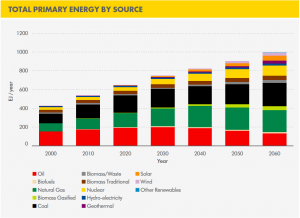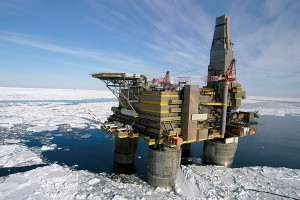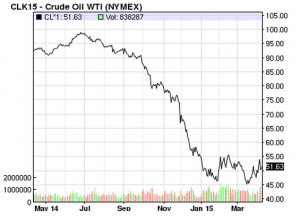Shell announced last week that that it was making a 47 Billion UKP offer for BG Group, the exploration, production and LNG part of Brittish Gas that was made independent in in 1997 when it was split off from the retail and industrial gas business in the UK.
In my view, the move shows Shell’s commitment to long term strategic thinking , its conviction that the world will take action to reduce its carbon footprint over the coming decades, and its opinion that the slide in oil prices is probably over.
Scenario Planning and the Long Term
Shell has been using scenarios to think through an uncertain future since the 1960s and I use its material, and the writings of Pierre Wack, the founder of the scenario group at Shell to teach long terms strategic thinking to MBA students and Sr. Executives in our programs at IESE Business School.

In its current set of scenarios, Shell projects that in the next twenty years the world will see an enormous shortage in primary energy as well as an increasingly apparant climate crisis and its commitment to gas and deep water exploration and production is consistent with this view.
Shell already acquired Repsol’s LNG business in 2013 and has been making a number of investments over the last few years to increase its gas sales which were already one of the highest of the International Oil Companies and has grown 40% since 2010.

Some of those assets, such as the giant Sakhalin field off the coast of Russia or Shell’s participation in Nigerian Natural Gas exposed the company to some geopolitical risks and the deal with BG Group not only adds another 20% to Shell’s production making it the world’s largest gas producer but also brings more stable sources to its portfolio such as Brazil, Australia, and eventually the United States.
BG Group is also doing interesting things in very deep water which again adds to Shell’s expertise in this area and in a world where energy becomes scarce, deep water exploration and production will become increasingly key.
Capping Carbon
The other part of Shell’s long term strategy does, I believe, have to do with its conviction that the world will, sooner or later, take steps to limit carbon emissions and that gas will replace oil and coal as the fuel of choice for electrical generation since it produces much less carbon dioxide. When combined with renewable sources such as wind and solar power, gas, has the added advantage of coming on line quite quickly and many analysts believe this is the future for electricity.
In the United States, the Federal Government has already imposed new rules on the States which will require a massive shift from coal to gas in order to meet emissions targets 10-15 years and more countries are likely to follow suit as a result of the Paris climate talks which will be held later this year. Shell’s rival, Exxon Mobile, for example, already contemplates a carbon tax into their strategic planning forecasts and such a tax will clearly favour natural gas in general and LNG in particular as liquefaction is the only practical means of moving gas in many situations.
Good time to buy
BG Group as been hard hit by the fall of oil and gas prices over the last months and the company has also gone through a management shakeup. As a result its shares have lost about 30% of their value in the last few months so Shell’s offer of a 50% premium will likely look good to BG Group’s shareholders. The fact that Shell makes the offer today seems to indicate that while the recovery may take time, maybe even 5-10, years, the price will not fall too much lower and thus the BG Group’s share price will eventually level off or even rebound.

I agree with Shell’s analysis as the current price of around $ 50 per barrel has been sufficient to curtail expansion of the Shale gas boom in the United States and there is no reason for Saudi Arabia to drive the price down further and in fact lots of reasons for it to keep it from falllig further such as paying for its new war in Yemen.

